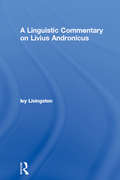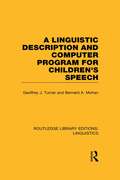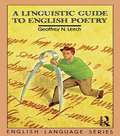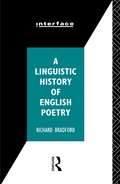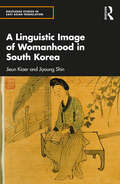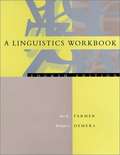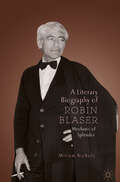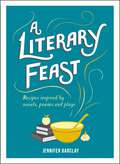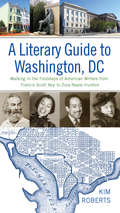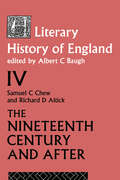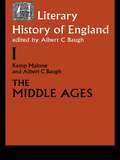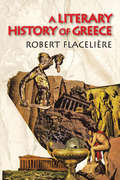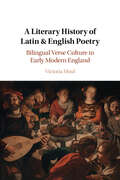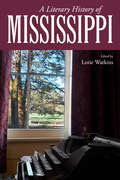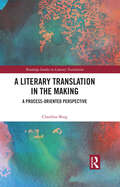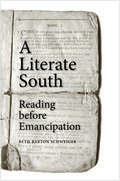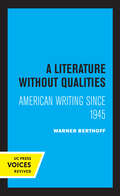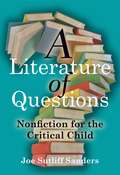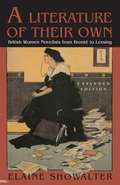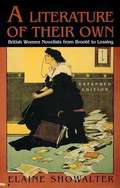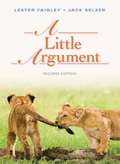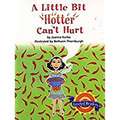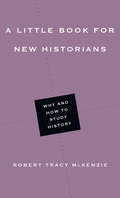- Table View
- List View
A Linguistic Commentary on Livius Andronicus (Studies in Classics)
by Ivy LivingstonAs the oldest literary Latin preserved in any quantity, the language of Livius shows many features of linguistic interest and raises intriguing questions of phonolgy, morphology and syntax.
A Linguistic Description and Computer Program for Children's Speech (Routledge Library Editions: Linguistics)
by Geoffrey J. Turner Bernard A. MohanThis book presents a framework for the linguistic analysis of speech and a computer program to process the results of this analysis. The model of description for the linguistic analysis is that known as ‘scale-and-category’ grammar. It is particularly suited for a study of how people use their language, and especially for a sociologically-oriented study of linguistic behaviour. By incorporating a concept of ‘delicacy’, it enables the investigator to vary, according to his particular interests, the amount of detail he enters into at various points in the description. The present authors have made use of this facility and discuss the special interests, sociological and psychological, that influenced their choice of detail. The computer program analyzes the grammatical structures written in a linear notation. A second version has been written which allows easy modification to handle a variety of grammatical schemes, and the program has application to the processing of the analysis of sequential behaviour in general, especially where there are complex relations between the units analyzed.
A Linguistic Guide to English Poetry
by Geoffrey N. LeechSeeks to demonstrate that the study of English poetry is enriched by the insights of modern linguistic analysis, and that linguistic and critical disciplines are not separate but complementary. Examining a wide range of poetry, Professor Leech considers many aspects of poetic style, including the language of past and present, creative language, poetic licence, repetition, sound, metre, context and ambiguity.
A Linguistic History of Ancient Cyprus
by Philippa M. SteeleThis pioneering volume approaches the languages and scripts of ancient Cyprus from an interdisciplinary point of view, with a primarily linguistic and epigraphic approach supplemented by a consideration of their historical and cultural context. The focus is on furthering our knowledge of the non-Greek languages/scripts, as well as appreciating their place in relation to the much better understood Greek language on the island. Following on from recent advances in Cypro-Minoan studies, these difficult, mostly Late Bronze Age inscriptions are reassessed from first principles. The same approach is taken for non-Greek languages written in the Cypriot Syllabic script during the first millennium BC, chiefly the one usually referred to as Eteocypriot. The final section is then dedicated to the Phoenician language, which was in use on Cyprus for some hundreds of years. The result is a careful reappraisal of these languages/scripts after more than a century of sometimes controversial scholarship.
A Linguistic History of English Poetry (Interface)
by Richard BradfordThis introductory book takes the reader through literary history from the Renaissance to Postmodernism, and considers individual texts as paradigms which can both reflect and unsettle their broader linguistic and cultural contexts. Richard Bradford provides detailed readings of individual texts which emphasize their relation to literary history and broader socio-cultural contexts, and which take into account developments in structuralism and postmodernism. Texts include poems by Donne, Herbert, Marvell, Milton, Pope, Wordsworth, Coleridge, Blake, Keats, Hopkins, Browning, Pound, Eliot, Carlos Williams, Auden, Larkin and Geoffrey Hill.
A Linguistic Image of Womanhood in South Korea (Routledge Studies In East Asian Translation Ser.)
by Jiyoung Shin Jieun KiaerA Linguistic Image of Womanhood in South Korea examines the verbal and non-verbal techniques used by contemporary South Korean women to navigate their society. South Korea is extremely hierarchical, and this is expressed through a complex array of different politeness levels in words, gestures, and behaviours. These hierarchies were formed over 500 years ago with the introduction of Neo-Confucianism from China, but patriarchal and paternalistic values still linger in contemporary Korean society. In this book, the authors have coined the term ‘language cosmetics’ to describe how women in South Korea modify their language and behaviour to conform to social expectations. The book examines womanhood and femininity as seen in popular Korean films, K-dramas, and K-pop. The authors note that feminine language and behaviour are not limited to women (as seen by the practice of aegyo or ‘acting cute’ within Korean boy bands), and they describe the tensions between gender hierarchy and socioeconomic status (as seen in the powerful and elegant samonim ladies of K-drama). This book will be informative for those studying and researching in the fields of Asian studies, cultural studies, linguistics, and East Asian languages, particularly those analysing how society and gender have an impact upon language.
A Linguistics Workbook (4th edition)
by Ann K. FarmerIt is extremely important that students become familiar with the structural properties of languages other than English. In A Linguistics Workbook, therefore, we have provided exercises based on a wide variety of the world's languages.
A Literary Approach to the New Testament
by John Paul PritchardFrom the book: The literary approach views form and content as one and is concerned with what the book is. Just as the literary interpreter of Chaucer requires a wealth of information and insight concerning the times of Chaucer and the influences at work in him, so the literary interpreter of the New Testament requires information about it and insights into it. Knowing what the book is in itself and in its relations frequently clarifies significantly what the book means. General readers will profit from the presentation of this knowledge in developing their own insights into the New Testament. In asserting that the reader of the New Testament will find greater reward and understanding if he is a Christian, there is no intent to belittle the values of the book for non-Christian readers. Such readers should, however, exercise what Coleridge described as "the willing suspension of disbelief for a season" in order to enter, at least temporarily, into the spirit of the work. If we endeavor to read in this spirit, we shall find the work richer and more rewarding. For literary interpretation of the New Testament, the traditional Sunday school presentation has contributed little beyond acquainting children with episodes and agents. In it books are seldom treated as wholes made by an author with specific purpose and artistic designs. Books are to be analyzed upon sound anatomical principles for study of what they are before ideas for moral and religious instruction are drawn from them.
A Literary Biography of Robin Blaser: Mechanic of Splendor (Modern and Contemporary Poetry and Poetics)
by Miriam NicholsA Literary Biography of Robin Blaser: Mechanic of Splendor is the first major study illustrating Robin Blaser’s significance to North American poetry. The poet Robin Blaser (1925–2009) was an important participant in the Berkeley Renaissance of the 1950s and San Francisco poetry circles of the 1960s. The book illuminates Blaser’s distinctive responses to and relationships with familiar writers including Robert Duncan, Jack Spicer, and Charles Olson via their correspondence. Blaser contributed to the formation of the serial poem as a dominant mode in post-war New American poetry through his work and engagement with the poetry communities of the time. Offering a new perspective on a well-known and influential period in American poetry, Miriam Nichols combines the story of Blaser’s life—coming from a mid-western conservative religious upbringing and his coming of age as a gay man in Berkeley, Boston, and San Francisco—with critical assessments of his major poems through unprecedented archival research. This literary biography presents Blaser’s poetry and poetics in the many contexts from which it came, ranging from the Berkeley Renaissance to the Vancouver scene; from surrealism to phenomenology; from the New American poetry to the Canadian postmodern; from the homoerotic to high theory. Throughout, Blaser’s voice is heard in the excitement of his early years in Berkeley and Boston and the seriousness of the later years where he was doing most of his living in his work.
A Literary Feast: Recipes Inspired by Novels, Poems and Plays
by Jennifer Barclay‘One cannot think well, love well, sleep well, if one has not dined well.’Virginia Woolf, A Room of One’s OwnPrepare your senses for a feast of delicious food scenes in literature accompanied with recipes to bring them to life in your very own kitchen, including Turkish delight Edmund wouldn’t be able to resist, roast goose the Cratchits would be proud of and cucumber sandwiches Algernon would be loath to share.This book is perfect for anyone who enjoys spending their days with a book in one hand and a saucepan in the other.
A Literary Guide to Washington, DC: Walking in the Footsteps of American Writers from Francis Scott Key to Zora Neale Hurston
by Kim RobertsThe site of a thriving literary tradition, Washington, DC, has been the home to many of our nation’s most acclaimed writers. From the city’s founding to the beginnings of modernism, literary luminaries including Walt Whitman, Paul Laurence Dunbar, Alice Dunbar-Nelson, Henry Adams, Langston Hughes, and Zora Neale Hurston have lived and worked at their craft in our nation’s capital. In A Literary Guide to Washington, DC, Kim Roberts offers a guide to the city’s rich literary history. Part walking tour, part anthology, A Literary Guide to Washington, DC is organized into five sections, each corresponding to a particularly vibrant period in Washington’s literary community. Starting with the city’s earliest years, Roberts examines writers such as Hasty-Pudding poet Joel Barlow and "Star-Spangled Banner" lyricist Francis Scott Key before moving on to the Civil War and Reconstruction and touching on the lives of authors such as Charlotte Forten Grimké and James Weldon Johnson. She wraps up her tour with World War I and the Jazz Age, which brought to the city some writers at the forefront of modernism, including the first American to win the Nobel Prize for Literature, Sinclair Lewis. The book’s stimulating tours cover downtown, the LeDroit Park and Shaw neighborhoods, Lafayette Square, and the historic U Street district, bringing the history of the city to life in surprising ways.Written for tourists, literary enthusiasts, amateur historians, and armchair travelers, A Literary Guide to Washington, DC offers a cultural tour of our nation's capital through a literary lens.
A Literary History of England Vol. 4
by Richard D. Altick Samuel C. ChewFirst published in 1959. The scope of this four volume work makes it valuable as a work of reference, connecting one period with another an placing each author clearly in the setting of his time. This is the fourth volume and includes the Nineteeth Century and after (1789-1939).
A Literary History of England: Vol 1: The Middle Ages (to 1500)
by Albert C. Baugh Kemp MaloneThe paperback edition, in four volumes, of this standard work will make it readily available to students. The scope of the work makes it valuable as a work of reference, connecting one period with another and placing each author clearly in the setting of his time. Reviewing the first edition, The Times Literary Supplement commented: ‘in inclusiveness and in judgment it has few rivals of its kind’. This first volume covers The Middle Ages (to 1500) in two sections: The Old English Period (to 1100) by Kemp Malone (John Hopkins University), and The Middle English Period (1100-1500) by Albert C. Baugh (University of Pennsylvania).
A Literary History of Greece
by Robert FlaceliereThere are several good histories of Greek literature of various shapes and sizes, but the purpose of this book is not simply to consider the literature of ancient Greece as an isolated subject, treating each of the literary modes - epic, lyric, drama, history, philosophy, and rhetoric - in terms of its own evolution. Instead, Robert Flaceliere provides a Greek history that deals with all the important works of Hellenic literature that are still of interest to contemporary readers; and he does this in chronological order with an accurate account of their historical background.Flaceliere follows the history of Greece down through the centuries as the writer records it. He describes the political atmosphere in the nation and the advances in the other arts that influenced literature. The author understands Sappho's rhapsodies; girlish love in the context of the acceptance of homosexuality in that era. He sympathizes with the unrequited passion of the penniless Archilochos. He appreciates Pindar's pacifist tendencies, Herodotus' upright insistence on truth, and Euripides' doubts about the existence of the gods. For the classical centuries, so rich in talent and genius, the author follows the successive generations systematically so as to distinguish the special features of each, what it owes to the preceding generation and how it paves the way for the next.Since this is a literary history, attention is mainly focused on the writers and their works, but by displaying these in their political, social, artistic and scientific setting, Flaceliere gives a better understanding of the production and significance of these wonderful achievements of the human spirit. Due to the wide range of material presented, "A Literary History of Greece" can be used as a reference book as well as for enjoyment reading.
A Literary History of Latin & English Poetry: Bilingual Verse Culture in Early Modern England
by Victoria MoulVictoria Moul's groundbreaking study uncovers one of the most important features of early modern English poetry: its bilingualism. The first guide to a forgotten literary landscape, this book considers the vast quantities of poetry that were written and read in both Latin and English from the sixteenth to the eighteenth century. Introducing readers to a host of new authors and drawing on hundreds of manuscript as well as print sources, it also reinterprets a series of landmarks in English poetry within a bilingual literary context. Ranging from Tottel's miscellany to the hymns of Isaac Watts, via Shakespeare, Jonson, Herbert, Marvell, Milton and Cowley, this revelatory survey shows how the forms and fashions of contemporary Latin verse informed key developments in English poetry. As the complex, highly creative interactions between the two languages are revealed, the work reshapes our understanding of what 'English' literary history means.
A Literary History of Mississippi (Heritage of Mississippi Series)
by Lorie WatkinsWith contributions by Ted Atkinson, Robert Bray, Patsy J. Daniels, David A. Davis, Taylor Hagood, Lisa Hinrichsen, Suzanne Marrs, Greg O'Brien, Ted Ownby, Ed Piacentino, Claude Pruitt, Thomas J. Richardson, Donald M. Shaffer, Theresa M. Towner, Terrence T. Tucker, Daniel Cross Turner, Lorie Watkins, and Ellen WeinauerMississippi is a study in contradictions. One of the richest states when the Civil War began, it emerged as possibly the poorest and remains so today. Geographically diverse, the state encompasses ten distinct landform regions. As people traverse these, they discover varying accents and divergent outlooks. They find pockets of inexhaustible wealth within widespread, grinding poverty. Yet the most illiterate, disadvantaged state has produced arguably the nation's richest literary legacy. Why Mississippi?What does it mean to write in a state of such extremes? To write of racial and economic relations so contradictory and fraught as to defy any logic? Willie Morris often quoted William Faulkner as saying, "To understand the world, you must first understand a place like Mississippi." What Faulkner (or more likely Morris) posits is that Mississippi is not separate from the world. The country's fascination with Mississippi persists because the place embodies the very conflicts that plague the nation.This volume examines indigenous literature, Southwest humor, slave narratives, and the literature of the Civil War. Essays on modern and contemporary writers and the state's changing role in southern studies look at more recent literary trends, while essays on key individual authors offer more information on luminaries including Faulkner, Eudora Welty, Richard Wright, Tennessee Williams, and Margaret Walker. Finally, essays on autobiography, poetry, drama, and history span the creative breadth of Mississippi's literature. Written by literary scholars closely connected to the state, the volume offers a history suitable for all readers interested in learning more about Mississippi's great literary tradition.
A Literary Translation in the Making: A Process-Oriented Perspective (Routledge Studies in Literary Translation)
by Claudine BorgThis book presents a holistic picture of the practice of an experienced literary translator working in situ, highlighting the value of in-depth process studies for the discipline and offering a model for future similar studies. Bringing together Cognitive Translation Studies (CTS) and literary translation, Borg interrogates existing assumptions in CTS and sheds light on the value of a combined look at both cognitive and social processes in literary translation. The volume extends the scope of existing CTS studies with its comprehensive examination of the work of one translator and exploration of the wide range of materials from draft to finished translation. This unique model allows for a greater understanding of the actions, decisions, motivations, and work practices of individual translators as well as of their interactions with other participants in the practice of a literary translation. Making the case for in-depth process research in illuminating the dynamics of translation production and working practices, this innovative book will be of interest to students and scholars in translation and interpreting studies, especially those interested in literary translation and cognitive approaches.
A Literate South: Reading before Emancipation
by Beth Barton SchweigerA provocative examination of literacy in the American South before emancipation, countering the long-standing stereotype of the South’s oral tradition Schweiger complicates our understanding of literacy in the American South in the decades just prior to the Civil War by showing that rural people had access to a remarkable variety of things to read. Drawing on the writings of four young women who lived in the Blue Ridge Mountains, Schweiger shows how free and enslaved people learned to read, and that they wrote and spoke poems, songs, stories, and religious doctrines that were circulated by speech and in print. The assumption that slavery and reading are incompatible—which has its origins in the eighteenth century—has obscured the rich literate tradition at the heart of Southern and American culture.
A Literature Without Qualities: American Writing Since 1945 (Quantum Books)
by Warner B. BerthoffThis title is part of UC Press's Voices Revived program, which commemorates University of California Press’s mission to seek out and cultivate the brightest minds and give them voice, reach, and impact. Drawing on a backlist dating to 1893, Voices Revived makes high-quality, peer-reviewed scholarship accessible once again using print-on-demand technology. This title was originally published in 1979.
A Literature of Questions: Nonfiction for the Critical Child
by Joe Sutliff SandersNonfiction books for children—from biographies and historical accounts of communities and events to works on science and social justice—have traditionally been most highly valued by educators and parents for their factual accuracy. This approach, however, misses an opportunity for young readers to participate in the generation and testing of information. In A Literature of Questions, Joe Sutliff Sanders offers an innovative theoretical approach to children&’s nonfiction that goes beyond an assessment of a work&’s veracity to develop a book&’s equivocation as a basis for interpretation. Addressing how such works are either vulnerable or resistant to critical engagement, Sanders pays special attention to the attributes that nonfiction shares with other forms of literature, including voice and character, and those that play a special role in the genre, such as peritexts and photography. The first book-length work to theorize children&’s nonfiction as nonfiction from a literary perspective, A Literature of Questions carefully explains how the genre speaks in unique ways to its young readers and how it invites them to the project of understanding. At the same time, it clearly lays out a series of techniques for analysis, which it then applies and nuances through extensive close readings and case studies of books published over the past half century, including recent award-winning books such as Tanya Lee Stone&’s Almost Astronauts: Thirteen Women Who Dared to Dream and We Are the Ship: The Story of Negro League Baseball by Kadir Nelson. By looking at a text&’s willingness or reluctance to let children interrogate its information and ideological context, Sanders reveals how nonfiction can make young readers part of the project of learning rather than passive recipients of information.
A Literature of Their Own: British Women Novelists from Bronte to Lessing
by Elaine ShowalterWhen first published in 1977, A Literature of Their Own quickly set the stage for the creative explosion of feminist literary studies that transformed the field in the 1980s. Launching a major new area for literary investigation, the book uncovered the long but neglected tradition of women writers in England. A classic of feminist criticism, its impact continues to be felt today. This revised and expanded edition contains a new introductory chapter surveying the book's reception and a new postscript chapter celebrating the legacy of feminism and feminist criticism in the efflorescence of contemporary British fiction by women.
A Literature of Their Own: British Women Novelists from Brontë to Lessing
by Elaine ShowalterWhen first published in 1977, "A Literature of Their Own" quickly set the stage for the creative explosion of feminist literary studies that transformed the field in the 1980s. Launching a major new area for literary investigation, the book uncovered the long but neglected tradition of women writers in England. A classic of feminist criticism, its impact continues to be felt today. This revised and expanded edition contains a new introductory chapter surveying the book's reception and a new postscript chapter celebrating the legacy of feminism and feminist criticism in the efflorescence of contemporary British fiction by women.
A Little Argument
by Jack Selzer Lester B. FaigleyThis remarkable, inexpensive guide packs a comprehensive look at writing (and analyzing) arguments into 200 brief, accessible pages. Best-selling authors Lester Faigley and Jack Selzer offer clear, engaging chapters covering what argument is, how to read (and view) arguments critically, how to write a variety of persuasive arguments, and how to support your arguments with good reasons and appropriate documentation.
A Little Bit “Hotter” Can’t Hurt [Grade 3]
by Joanna Korba Bethann ThornburghNIMAC-sourced textbook
A Little Book for New Historians: Why and How to Study History (Little Books Series)
by Robert Tracy McKenzieMany people think of history as merely "the past"—or at most, information about the past. But the real work of a historian is to listen to the voices of those who have gone before and humbly remember the flesh and blood on the other side of the evidence. What is their story? How does it become part of our own? In A Little Book for New Historians veteran historian Robert Tracy McKenzie offers a concise, clear, and beautifully written introduction to the study of history. In addition to making a case for the discipline in our pragmatic, "present-tense" culture, McKenzie lays out necessary skills, methods, and attitudes for historians in training. Loaded with concrete examples and insightful principles, this primer shows how the study of history, faithfully pursued, can shape your heart as well as your mind.
